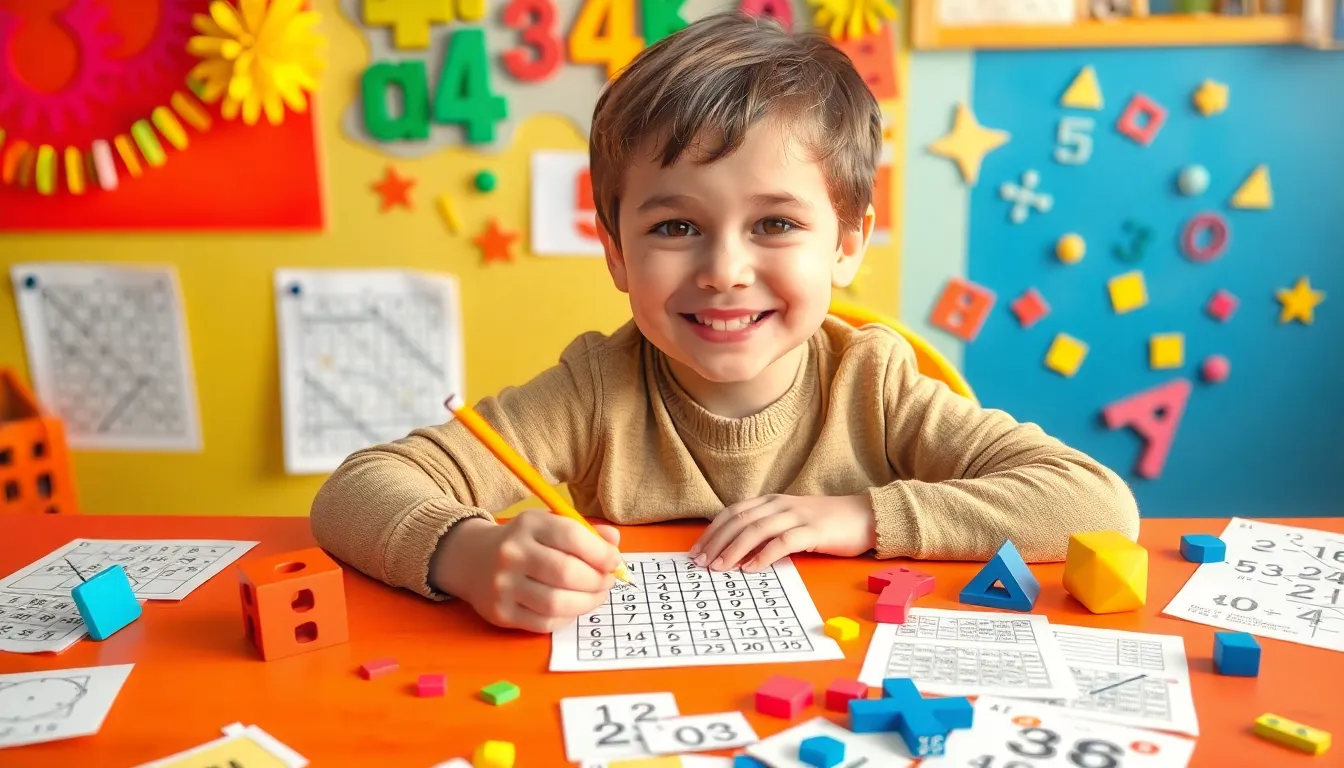Math puzzles are a fantastic way to spark children’s interest in numbers while enhancing their problem-solving skills. These engaging challenges not only make learning fun but also encourage critical thinking and creativity. As kids tackle various puzzles, they develop a deeper understanding of mathematical concepts without even realizing it.
From simple riddles to complex brain teasers, math puzzles cater to different age groups and skill levels. They can be easily integrated into everyday learning, making math feel less daunting and more enjoyable. By introducing children to these stimulating activities, parents and educators can foster a lifelong love for math that goes beyond the classroom.
Table of Contents
ToggleBenefits of Math Puzzles for Children
Math puzzles offer numerous advantages for children, providing engaging ways to develop essential skills. These activities not only make learning enjoyable but also improve cognitive functions crucial for academic success.
Enhanced Problem-Solving Skills
Math puzzles promote hands-on learning by requiring children to analyze situations, identify patterns, and devise solutions. Engaging with these challenges encourages kids to think critically about various approaches, fostering a mindset geared towards overcoming obstacles. Consistent practice with diverse math puzzles leads to stronger problem-solving abilities and increased confidence in tackling real-world situations.
Improved Critical Thinking
Math puzzles enhance critical thinking by pushing children to evaluate information and draw logical conclusions. As kids work through difficulties, they learn to focus on details and synthesize ideas effectively. This process of reasoning and deduction contributes to greater academic performance across subjects, as enhanced critical thinking skills apply to reading comprehension, science, and social studies as well.
Types of Math Puzzles for Children

Math puzzles come in various forms, each targeting different skills and interests. Here are three popular categories of math puzzles for children.
Logic Puzzles
Logic puzzles challenge children’s reasoning and critical thinking skills. These puzzles often involve a set of conditions or clues that require deductive reasoning to find a solution. For example, puzzles such as Sudoku or nonograms engage kids in placing numbers or shading squares in a grid based on specific rules. Regular practice with logic puzzles enhances problem-solving abilities and encourages children to think analytically.
Number Puzzles
Number puzzles focus on arithmetic and numerical relationships. These puzzles, such as cross-number puzzles and magic squares, encourage children to manipulate numbers and explore mathematical operations like addition, subtraction, multiplication, and division. They help children develop number sense and numerical fluency. Engaging with number puzzles boosts not only mathematical skills but also fosters a love for numbers through enjoyable challenges.
Geometric Puzzles
Geometric puzzles introduce children to shapes, spatial reasoning, and measurement concepts. Examples include tangrams, pattern blocks, and geometric riddles. These puzzles promote an understanding of geometry while enhancing visual-spatial skills. By working with geometric puzzles, children learn to recognize shapes, explore symmetry, and develop the ability to visualize and manipulate objects in space, which are essential skills in mathematics and everyday life.
How to Introduce Math Puzzles to Children
Introducing math puzzles to children engages their interest and enhances their learning experience. By tailoring the puzzles to their age and using interactive approaches, parents and educators can maximize the benefits.
Age-Appropriate Puzzles
Selecting age-appropriate puzzles ensures children remain engaged while developing their skills. For preschoolers, simple counting puzzles and shape sorting introduce basic concepts. For early elementary students, word problems and basic arithmetic puzzles enhance problem-solving abilities. As children progress to middle school, logic puzzles and more complex number puzzles cater to their growing analytical skills. Each age group gains specific benefits from targeted puzzles, facilitating continuous mathematical development.
Interactive Approaches
Utilizing interactive approaches boosts children’s enthusiasm for math puzzles. Incorporating games or technology, like math apps and online puzzle platforms, engages kids in a dynamic learning environment. Group activities, such as puzzle contests or collaborative problem-solving sessions, foster teamwork and communication. These interactive elements stimulate interest, making math concepts relevant and enjoyable.
Popular Math Puzzle Resources
Numerous resources exist for children to explore math puzzles, enhancing both learning and enjoyment. Parents and educators can find effective tools through books and online platforms.
Books and Publications
Books and publications serve as excellent resources for math puzzles. Notable titles include:
- “The Grapes of Math” by Greg Tang – This book introduces riddles that encourage creative thinking and problem-solving.
- “Math Puzzles for Kids” by J. E. Smith – An engaging collection offering a wide range of puzzles targeting different skill levels.
- “Math Adventures: Puzzles and Games” by L. Parker – This publication combines games and puzzles to make math concepts more approachable.
These books create opportunities for children to engage with mathematical concepts independently or collaboratively, fostering a love for math.
Online Platforms
Online platforms provide interactive experiences for learning through math puzzles. Popular sites include:
- Prodigy Math – An engaging platform that transforms math practice into a fun, game-like adventure.
- Coolmath Games – Featuring a variety of logic and number puzzles that stimulate critical thinking.
- Math Playground – Offering interactive math games and puzzles designed for elementary students, balancing skill development with play.
These resources not only encourage children to improve their math skills but also help develop a lasting interest in the subject.
Math puzzles serve as a powerful tool for nurturing children’s love for numbers and enhancing their cognitive skills. By engaging with these challenges, kids not only develop problem-solving abilities but also cultivate critical thinking and creativity. The variety of puzzles available ensures that there’s something for every child, regardless of age or skill level.
Incorporating math puzzles into daily activities can transform learning into a fun and dynamic experience. With the right resources and an interactive approach, parents and educators can inspire a lifelong appreciation for mathematics. Ultimately, these engaging activities lay a strong foundation for academic success and a deeper understanding of the world around them.









